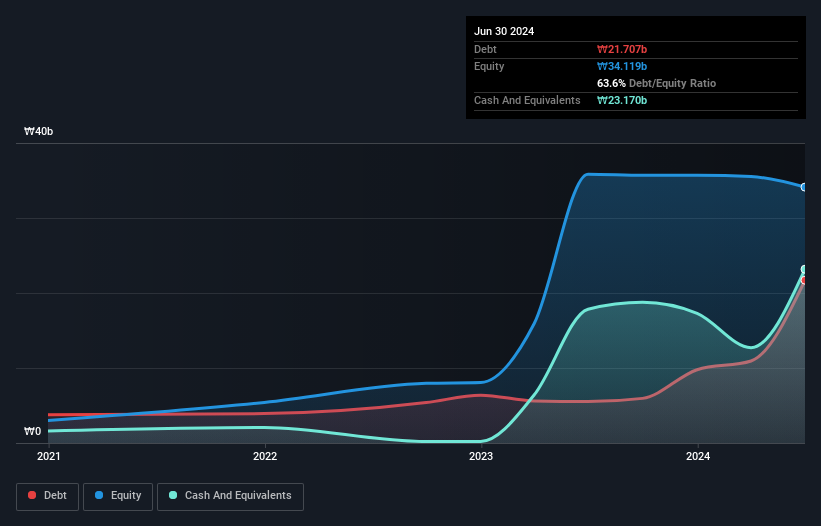Howard Marks put it nicely when he said that, rather than worrying about share price volatility, 'The possibility of permanent loss is the risk I worry about... and every practical investor I know worries about.' It's only natural to consider a company's balance sheet when you examine how risky it is, since debt is often involved when a business collapses. We note that GGUMBI Inc. (KOSDAQ:407400) does have debt on its balance sheet. But the more important question is: how much risk is that debt creating?
What Risk Does Debt Bring?
Generally speaking, debt only becomes a real problem when a company can't easily pay it off, either by raising capital or with its own cash flow. Ultimately, if the company can't fulfill its legal obligations to repay debt, shareholders could walk away with nothing. However, a more usual (but still expensive) situation is where a company must dilute shareholders at a cheap share price simply to get debt under control. Of course, debt can be an important tool in businesses, particularly capital heavy businesses. When we examine debt levels, we first consider both cash and debt levels, together.
See our latest analysis for GGUMBI
What Is GGUMBI's Net Debt?
You can click the graphic below for the historical numbers, but it shows that as of June 2024 GGUMBI had ₩21.7b of debt, an increase on ₩5.52b, over one year. However, its balance sheet shows it holds ₩23.2b in cash, so it actually has ₩1.46b net cash.

How Healthy Is GGUMBI's Balance Sheet?
We can see from the most recent balance sheet that GGUMBI had liabilities of ₩32.8b falling due within a year, and liabilities of ₩6.03b due beyond that. Offsetting these obligations, it had cash of ₩23.2b as well as receivables valued at ₩7.72b due within 12 months. So its liabilities outweigh the sum of its cash and (near-term) receivables by ₩7.97b.
Since publicly traded GGUMBI shares are worth a total of ₩79.4b, it seems unlikely that this level of liabilities would be a major threat. However, we do think it is worth keeping an eye on its balance sheet strength, as it may change over time. While it does have liabilities worth noting, GGUMBI also has more cash than debt, so we're pretty confident it can manage its debt safely. When analysing debt levels, the balance sheet is the obvious place to start. But it is GGUMBI's earnings that will influence how the balance sheet holds up in the future. So if you're keen to discover more about its earnings, it might be worth checking out this graph of its long term earnings trend.
Over 12 months, GGUMBI reported revenue of ₩36b, which is a gain of 35%, although it did not report any earnings before interest and tax. Shareholders probably have their fingers crossed that it can grow its way to profits.
So How Risky Is GGUMBI?
We have no doubt that loss making companies are, in general, riskier than profitable ones. And the fact is that over the last twelve months GGUMBI lost money at the earnings before interest and tax (EBIT) line. And over the same period it saw negative free cash outflow of ₩16b and booked a ₩2.3b accounting loss. But at least it has ₩1.46b on the balance sheet to spend on growth, near-term. With very solid revenue growth in the last year, GGUMBI may be on a path to profitability. Pre-profit companies are often risky, but they can also offer great rewards. When analysing debt levels, the balance sheet is the obvious place to start. But ultimately, every company can contain risks that exist outside of the balance sheet. To that end, you should learn about the 3 warning signs we've spotted with GGUMBI (including 1 which is potentially serious) .
If you're interested in investing in businesses that can grow profits without the burden of debt, then check out this free list of growing businesses that have net cash on the balance sheet.
New: Manage All Your Stock Portfolios in One Place
We've created the ultimate portfolio companion for stock investors, and it's free.
• Connect an unlimited number of Portfolios and see your total in one currency
• Be alerted to new Warning Signs or Risks via email or mobile
• Track the Fair Value of your stocks
Have feedback on this article? Concerned about the content? Get in touch with us directly. Alternatively, email editorial-team (at) simplywallst.com.
This article by Simply Wall St is general in nature. We provide commentary based on historical data and analyst forecasts only using an unbiased methodology and our articles are not intended to be financial advice. It does not constitute a recommendation to buy or sell any stock, and does not take account of your objectives, or your financial situation. We aim to bring you long-term focused analysis driven by fundamental data. Note that our analysis may not factor in the latest price-sensitive company announcements or qualitative material. Simply Wall St has no position in any stocks mentioned.
About KOSDAQ:A407400
Excellent balance sheet with low risk.
Market Insights
Community Narratives



